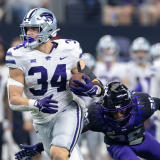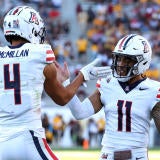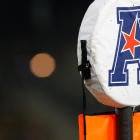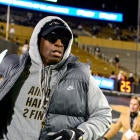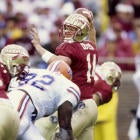Mike Aresco should be hiking in Switzerland. Unfortunately, that European vacation is off now that UConn has bolted the American Athletic Conference. The news hit the AAC's commissioner last week about the same shocking way it hit all of us.
"I went to bed early that [Friday] night," Aresco said. "I put my phone on mute so I wouldn't wake my wife. Sure enough, when I checked my phone in the morning, all hell broke loose."
UConn's departure was less an indicator of a national trend and more local politics. UConn has never seemed comfortable in the AAC. It certainly wasn't satisfied finishing just below the Power Five cut line in the last major round of conference realignment.
The school formally announced this week that it will join the Big East in all sports other than football (which is not sponsored by the conference) for the 2020-21 season. Where UConn football lands remains after leaving the AAC is a mystery.
The fact that UConn went back to its ancestral home in hoops without a clear direction for football should tell you all you need to know.
"Look, I don't know what their attitude is toward football, but it's pretty evident," Aresco said. "They just have new priorities now."
UConn, Aresco and the AAC were the toast of college athletics in 2014 when the Huskies won the national championship in basketball and UCF beat Baylor in the Fiesta Bowl.
"What I'm worried about," Aresco said at the time, "did we hit our high water mark in the first year?"
That remains to be seen. In this conversation with CBS Sports, Aresco discusses the direction of the AAC, his confidence about the strength of the league in basketball and why it might just stick with 11 members in football, which could make the American stronger in that sport when all is said and done.
"There is no sense of despair at all with our schools," he said.
CBS Sports: What are the emotions right now?
Aresco: "The emotion is determination and matter of factness. We're just moving on. We're a strong conference now. This is nothing like seven years ago [when the league formed]. In terms of strength and membership, we could stay at 11 and be very strong. We're a strong basketball league, very strong. Memphis has the No. 1 recruiting class in the country. Houston, with Kelvin [Sampson] now. Wichita State, Cincinnati and the Florida schools. Football, we're very powerful. We could strengthen ourselves. We could stay at 11. We're not sure what we're going to do."
CBS Sports: Is there an indicator which way the new contract might go now that UConn has left? (The AAC signed a TV deal worth $1 billion over 12 years with ESPN beginning in 2020.)
Aresco: "We'll definitely talk to [ESPN] about some adjustments in terms of scheduling. Our football down the road could be better. We've gained value since the deal was done. Look at what USF has done. They now have Alabama, Florida and Miami coming to their stadium [in the future]."
CBS Sports: Do you have a feeling on whether you stay at 11 teams or expand and go to 12?
Aresco: "It's not something we have to do. Unless you can get somebody who enhances our brand and our strength, it's not worth doing. Geography is a factor but not the biggest factor. We didn't take Wichita State [in basketball] because they happen to be close to our schools. We took them because they're a tremendous basketball team. I think we'll have a serious discussion. If we can't find anyone that makes sense, we would stay at 11."
CBS Sports: If you go to 12, how many schools are out there that can bring $6 million-$7 million valuation to the table to become a 12th AAC member? (That's what AAC teams were set to earn in the new ESPN TV contract.)
Aresco: "Probably very few."
CBS Sports: If you keep your championship game with 11 schools, you'd most likely have to get a waiver from the NCAA. How do you approach that?
Aresco: "There are three arguments about getting either a waiver or legislation: One, a conference should be able to determine its champion any way it wants. Two, why would you encourage us to go back to 12 and essentially raid another conference? Third, why would you force us to contract to 10 [to play a round-robin conference schedule]?
"Give us the waiver or pass legislation. We've been talking to the Big Ten. They did it [played with 11 members] for 20 years. … We could play a championship game with our top two teams like the Big 12 … I think we could get that -- have more games between UCF and Memphis and UCF and Houston."
CBS Sports: How surprised were you last week when the news broke?
Aresco: "At that point, I talked to UConn. They were noncommittal about what they were doing. I sort of suspected what was going on by then. Did it come as a huge surprise? No. It's not something I necessarily expected, but it's been percolating for some time."
CBS Sports: Is this situation unique to UConn or a symptom of Group of Five struggles keeping up with the Power Five?
Aresco: "I don't know. UConn occupied a unique place, the one school that didn't get into the P5. It's been tough for them. I'm not losing any sleep about how we dealt with UConn over the years. … We did everything we could knowing they were unhappy about things. Look, I don't know what their attitude is toward football, but it's pretty evident. They just have new priorities now."
CBS Sports: Where do you think UConn football ends up now?
Aresco: "I can't say. The one thing I can tell you, they won't be playing in our conference [after 2019]."
CBS Sports: Have any particulars been discussed on UConn's buyout? (League bylaws state any departing member has to give 27-month notice and pay $10 million.)
Aresco: "We'll strictly abide by the bylaws. They are going to have to approach us on that. If they want to leave earlier, something has be negotiated on that."
CBS Sports: It was only five years ago UConn won the national championship in the league's first season.
Aresco: "It's a tribute to what these schools have done the last six years. It's ironic. The first year of the conference, they won the national championship. For whatever reason, as our basketball got better, unfortunately, they struggled."







